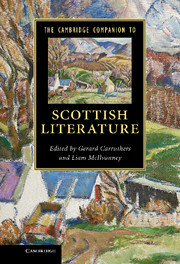Book contents
- Frontmatter
- Contents
- Notes on Contributors
- Acknowledgements
- Chronology
- Introduction
- 1 Scottish Literature before Scottish Literature
- 2 The Medieval Period
- 3 Reformation and Renaissance
- 4 The Aftermath of Union
- 5 Robert Burns
- 6 Enlightenment, Romanticism and the Scottish Canon
- 7 Scott and the Historical Novel
- 8 The Gaelic Tradition
- 9 Scottish Gothic
- 10 Victorian Scottish Literature
- 11 Robert Louis Stevenson
- 12 Hugh MacDiarmid and the Scottish Renaissance
- 13 Popular Fiction
- 14 Muriel Spark
- 15 The Glasgow Novel
- 16 ‘What is the language using us for?’
- 17 The Emergence of Scottish Studies
- 18 Otherworlds
- 19 Scottish Literature in Diaspora
- Index
- References
10 - Victorian Scottish Literature
Published online by Cambridge University Press: 05 January 2013
- Frontmatter
- Contents
- Notes on Contributors
- Acknowledgements
- Chronology
- Introduction
- 1 Scottish Literature before Scottish Literature
- 2 The Medieval Period
- 3 Reformation and Renaissance
- 4 The Aftermath of Union
- 5 Robert Burns
- 6 Enlightenment, Romanticism and the Scottish Canon
- 7 Scott and the Historical Novel
- 8 The Gaelic Tradition
- 9 Scottish Gothic
- 10 Victorian Scottish Literature
- 11 Robert Louis Stevenson
- 12 Hugh MacDiarmid and the Scottish Renaissance
- 13 Popular Fiction
- 14 Muriel Spark
- 15 The Glasgow Novel
- 16 ‘What is the language using us for?’
- 17 The Emergence of Scottish Studies
- 18 Otherworlds
- 19 Scottish Literature in Diaspora
- Index
- References
Summary
The Victorian period in Scottish literature has long been viewed with embarrassment if not disdain. ‘The less said about the two generations after Scott the better’, remarked Kurt Wittig in 1955. David Craig, writing in 1961, agreed: ‘from 1825 to 1880 there is next to nothing worth attention’. Scottish Victorianism was backward-looking and parochial. The spirit of Burns, shorn of all its radicalism, hung over popular poetry anthologies such as Whistle-Binkie, first published in the 1830s and reissued with new material throughout the century. In fiction, the dominant traditions were historical romance, typified by Robert Louis Stevenson, and nostalgic rural idylls epitomised by the so-called Kailyard fiction of J. M. Barrie and Ian Maclaren. The overwhelming image was of a rural, provincial culture, escaping into a pre-industrial past. In an influential book of 1951, the novelist George Blake complained that the ‘representative writers during the nineteenth century had hardly a single word to say about the revolution that was so dramatically overtaking’ them. Instead, the printing presses across the nation were flooded with books of reminiscences, typified by E. B. Ramsay’s Reminiscences of Scottish Life and Character (1857), which celebrated and lamented what Archibald Geikie termed ‘the gradual decline of national peculiarities’. The ascent of Victoria, it seemed, signalled the descent of Scottish culture.
This interpretation did not die easily. As late as 1988 a history of nineteenth-century Scottish literature opened with an essay which identified the late 1830s as ‘one of the most obvious and drastic turning points in the literary history of Scotland’ in which there was ‘a loss of cohesion and self-confidence, a decline which lasted about 50 years’. If the death of Walter Scott in 1832 signalled the end of an era of sustained cultural achievement, the departure of Thomas Carlyle for London in 1834 pointed to the death of the environment which had supported it. To Tom Nairn, ‘intellectual emigration’ in the nineteenth century emptied the country of its literary talent and left only a ‘rootless vacuum … a great “absence”’. Recent scholarship, however, has proved this conclusion to be drastically oversimplified. Research into the popular press has revealed a flourishing urban tradition of vernacular prose fiction.
- Type
- Chapter
- Information
- The Cambridge Companion to Scottish Literature , pp. 145 - 158Publisher: Cambridge University PressPrint publication year: 2012
References
- 2
- Cited by



